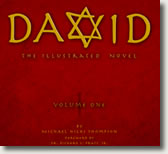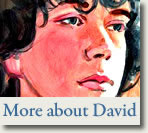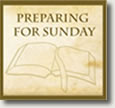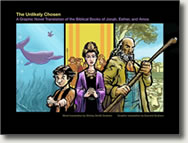Responding to Evil
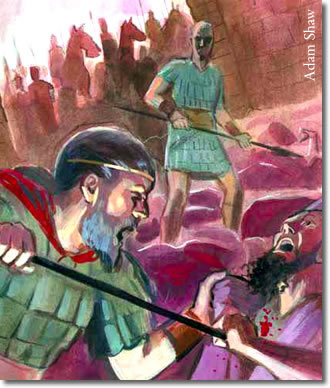 The king said, "You shall surely die, Ahimelech, you and all your father's house." The king said to the guard who stood around him, "Turn and kill the priests of the Lord, because their hand also is with David; they knew that he fled, and did not disclose it to me." —1 Samuel 22:16-17
The king said, "You shall surely die, Ahimelech, you and all your father's house." The king said to the guard who stood around him, "Turn and kill the priests of the Lord, because their hand also is with David; they knew that he fled, and did not disclose it to me." —1 Samuel 22:16-17
Now we see the face of evil. No longer are we dealing with interpersonal conflict, as destructive and horrible as that may be. Saul’s malevolence has moved to a systemic level. Anyone associated with David—including his family and those who come to his aid—is in mortal danger from the crazed king.
The contrast is stark. David is developing into a respected and trusted leader: Those who are “in distress… in debt… discontented gathered to him; and he became captain over them.” (1 Samuel 22:2) But as David’s stature grows, Saul sinks further into brutality. Here we read of him ordering a mass murder of the priests of Nob simply because they assisted David, who they believed to be a faithful servant to Israel's ruler.
Not even Saul’s army will carry out such violence, so Saul turns to Doeg the Edomite—a man who does not worship the God of Israel—to massacre the priestly household. It is a heinous act followed by the slaughter of the priests’ families and destruction of all their possessions. The sole survivor of the carnage is Abiathar, son of the priest Ahimelech, who is able to escape and find refuge with David.
Such unchecked evil leaves us questioning the nature and power of God. Why is Saul allowed to perpetrate such violence? Why Did God not intervene? If God is good, and God is God, how can such horrors happen?
In his commentary on Samuel for The New Interpreter’s Bible, biblical scholar Bruce Birch writes about the questions we ask around evil. The same questions that were asked thousands of years ago still plague us today, whenever we see violence perpetrated against innocent people by those who hold power and use it maliciously. “The hard truth of human freedom is that God does not stay the hand of one bent on evil,” Birch explains. The freedom God gives us extends both ways—God allows us to choose evil as well as good.
But this raises another question, as heartfelt as the others. Where, we cry as we survey the destruction, is God?
“God in these stories works through human agency,” Birch contends. “If God is with David, it is not to supernaturally predetermine his successes. They are the product of David’s gifts used in the service of God. …If God is present at such times, it is not to make decisions or determine actions for us. It is to support and enable the response of good in the face of evil.”
The response of good after such a tragedy is both compassion and responsibility. When confronted with the truth of what has happened to Ahimelech and his household, David does not abandon the priest's son. Rather he takes Abiathar under his care, pledging to keep him safe from Saul's wrath and assuming responsibility for his fate. ”God’s future lies with those who, like David, say, ‘We are responsible.’” Birch concludes, “It is a choosing of responsibility when the perpetrators of evil have chosen irresponsibility.”
In the end, we may not find satisfactory answers to the questions we ask, but one thing is clear. We have the freedom to choose our actions in this world, and though the choice is ours, we know which way God would have us go.
And the LORD God made all kinds of trees grow out of the ground—trees that were pleasing to the eye and good for food. In the middle of the garden were the tree of life and the tree of the knowledge of good and evil. —Genesis 2:9
Most "bad" things which happen do so because God gives a radical freedom to God's people; we are free people, not puppets on a string. But God does not cause "bad" things to happen. God loves us and grieves with us in our pain when "bad things" happen.... Any "bad" thing which happens is never the last word. Rather, God is the deepest and last word, and that word is love and eternal life with God.
— Douglass M. Bailey
excerpted from Why does God let bad things happen in the world?
Turn from evil and do good; seek peace and pursue it. —Psalm 34:14
People seem to think that it is in some way a proof that no merciful God exists, if we have so many wars. On the contrary, consider how in spite of centuries of sin and greed and lust and cruelty and hatred and avarice and oppression and injustice, spawned and bred by the free wills of men, the human race can still recover, each time, and can still produce man and women who overcome evil with good, hatred with love, greed with charity, lust and cruelty with sanctity. How could all this be possible without the merciful love of God, pouring out His grace upon us?
—Thomas Merton
The Seven Storey Mountain
For only if we admit the rank horror of evil can we hope for a God and a faith strong enough to redeem it.
—G. Lee Ramsey Jr.
excerpted from "The Pianist"
We frail humans are at one time capable of the greatest good and, at the same time, capable of the greatest evil. Change will only come about when each of us takes up the daily struggle ourselves to be more forgiving, compassionate, loving, and above all joyful in the knowledge that, by some miracle of grace, we can change as those around us can change too.
—Mairead Maguire
I rarely speak about God. To God, yes. I protest against Him. I shout at Him. But to open a discourse about the qualities of God, about the problems that God imposes, theodicy, no. And yet He is there, in silence, in filigree. —Elie Wiesel
The classic, mainstream answer as to how to reconcile the concept of a good God with the constant presence of evil in the world is to argue that the latter is the price we must pay for having personal autonomy, for the freedom to choose. God did not want to create automatons, so it is up to us as to how we utilize that freedom— and, too often, we use it in barbaric and savage ways. That is not related to God, or to God’s goodness—the true blame lies with each of us.
—Niles Goldstein
excerpted from Do You Believe in God?
Do not be overcome by evil, but overcome evil with good. —Romans 12:21
Human beings are fundamentally good. The aberration, in fact, is the evil one, for God created us ultimately for God, for goodness, for laughter, for joy, for compassion, for caring. —Archbishop Desmond Tutu
